Project
Global Producers in China: Empirical Evidence on FDI, Product-Mix and Emissions
Start of Project: 01.10.2023 — End of Project: 30.09.2025
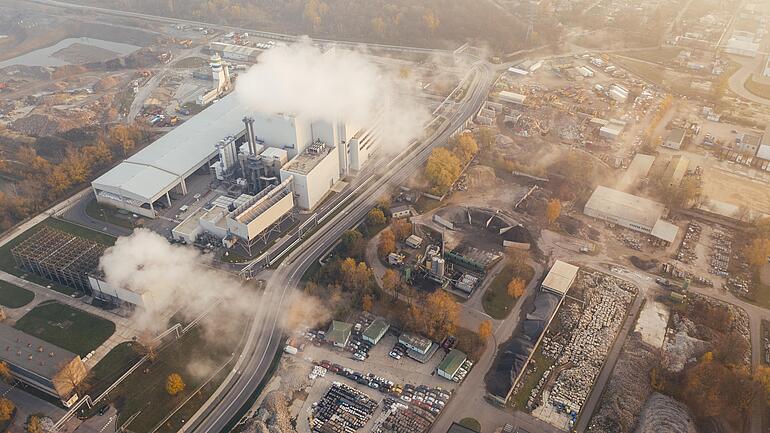
Against the backdrop of supply shortages during the COVID-19 pandemic and rising geopolitical risks, the issue of production reshoring has attracted increasing attention in EU policy debates. Some experts advise for a partial or complete withdrawal from locations such as China. But others who are less pessimistic, argue for the retention of production hubs. Unconnected with this debate, there is a parallel conversation about the environment where the decision to manufacture products at home (e.g., Germany) or overseas (e.g., China) is seen as key to reducing (or increasing) the amount of global emissions and pollution.
Many governments continue to expend vast amounts of time, effort and taxpayer’s budget in encouraging multinationals to invest in their countries. Yet, does the benefit of foreign direct investment (FDI) come at a cost to the environment? This question does not appear to have been adequately answered in existing empirical studies. Particularly for China, one of the most attractive FDI host countries worldwide, we know very little about the link between FDI and environmental costs. This fact is worrying, considering that China is Number One Producer of global Carbon dioxide (CO2) emissions.
Our research project aims at filling this gap by analyzing the link between foreign investment and environmental costs, focusing on firms – domestic and foreign multinational enterprises operating in China. More concretely, we focus on the following research questions:
- How have the emissions of the Greenhouse Gas and other pollutants evolved in China over time?
- How has foreign investment affected these emissions and the abatement of the pollutants?
- How environmentally clean are the production technologies used by foreign affiliates?
- What is the environmental footprint (e.g., severity of water, air, soil pollution) of foreign affiliates compared to local firms?
- How does the mix of products change, following the takeover of a host-country firm?
Our research aims at exploring new insights into the role of foreign investment – its link to pollution emissions and also its link to environmental abatement – for the world’s second largest economy and the largest CO2 emitter. In so doing, our research will extend existing empirical knowledge, serving as a relevant evidence base for shaping policy which deals with the relation between FDI and environment protection.
Selected key findings (state of Jan. 2025):
- We find that participating in global value chains (GVCs) generally leads to a lower pollutant intensity of firms in China and such effect can be further amplified if the firms in China received foreign direct investments (FDIs).
- We find that reductions in pollutant intensity are driven by applying improved production technologies rather than by removing pollutants after production. Production technology transfer is a dominant and more cost-effective channel through which FDIs exert a positive environment impact in China.
- We find that the effect of GVC participation on foreign firms’ pollutant intensity in China depends on whether they only sell their products in China or whether they (also) trade with other countries. The pollutant intensity increases in the former case and decreases in the latter. The effect of exports on pollutant intensity exceeds that of imports.
- Our findings suggest that trading partners and their sustainability requirements may affect the decision of foreign firms in China for the production cleanliness and thus their pollutant intensity.
Outreach activities
Project members have shared information about the project and discussed the preliminary results with academic experts in related research fields, decision makers from the politics and businesses and the interested public over time. We gave presentations and discussed our analyses and key findings at workshops, conferences and policy events, both in Germany and internationally.
- 2023
- Autumn School, organized by the China Center, Kiel University, Oct. 2023, Presentation by Wan-Hsin Liu
- 2024
- Academic Workshop "Advancements in Energy, Environmental, and Development Economics", organized by the Aberdeen Centre for Research in Energy Economics and Finance (ACREEF), University of Aberdeen, May 2024, Presentation by Zheng Wang
- “ChiKoN” China Forum, organized by the China Center, Kiel University, Jun. 2024, Presentation by Aoife Hanley
- European Trade Study Group (ETSG) Conference 2024 Athens, organized by the Athens University of Economics and Business, Sep. 2024, Presentation by Lars Hecker
- Forum on “The Future of US and German Policy toward Beijing”, organized by the Atlantic Council’s Europe Center, Nov. 2024, Discussion participation by Holger Görg
- Transatlantic Trade Relations Theme Evening, organized by the Kiel University’s Transatlantic Student Initiative (TSI), Nov. 2024, Panel discussion with Aoife Hanley
- Aarhus-Kiel Workshop, organized by the Research Centre for Firms and Industry Dynamics, Aarhus University and the Kiel Institute for the World Economy, Sandbjerg, Dec. 2024, Presentations by Lars Hecker and Finn Ole Semrau
- The Future of Free Trade, organized by the Friedrich Naumann Stiftung, Dec. 2024, Presentation and discussion participation by Holger Görg
- 2025
- Global China Conversations (GCC) #39, organized by the Kiel Institute China Initiative, Mar. 2025, Presentation by Aoife Hanley
Media contributions
In addition to presentations, workshops and events, the project results were also disseminated via interviews in the media.
- "China's growing grip on key German industries", published by Deutsche Welle, Mar 2., 2025, interview with Holger Görg (for more information see News from the Kiel Center for Globalization)
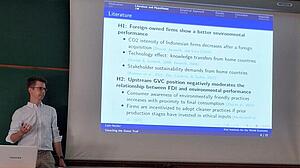
Lars Hecker at the ETSG in Athens
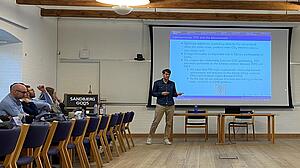
Finn Ole Semrau at the Aarhus-Kiel Workshop
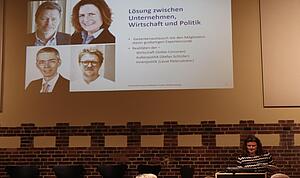
Aoife Hanley at the panel discussion by TSI and the US consulate
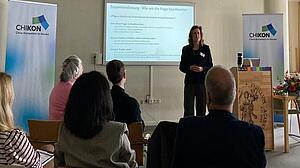
Aoife Hanley at the China Forum
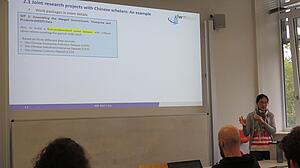
Wan-Hsin Liu at the Autumn School
Project Partners
Kiel Institute for the World Economy (IfW), Germany
Project lead
Project coordination
Funding







